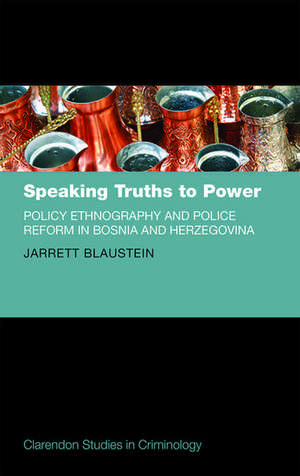Speaking Truths to Power: Policy Ethnography and Police Reform in Bosnia and Herzegovina: Clarendon Studies in Criminology
Autor Jarrett Blausteinen Limba Engleză Hardback – 21 mai 2015
Din seria Clarendon Studies in Criminology
- 30%
 Preț: 524.88 lei
Preț: 524.88 lei - 27%
 Preț: 539.99 lei
Preț: 539.99 lei - 30%
 Preț: 597.82 lei
Preț: 597.82 lei - 30%
 Preț: 539.03 lei
Preț: 539.03 lei - 30%
 Preț: 540.50 lei
Preț: 540.50 lei - 30%
 Preț: 518.78 lei
Preț: 518.78 lei - 30%
 Preț: 598.04 lei
Preț: 598.04 lei - 30%
 Preț: 521.83 lei
Preț: 521.83 lei - 30%
 Preț: 538.41 lei
Preț: 538.41 lei - 30%
 Preț: 537.95 lei
Preț: 537.95 lei - 30%
 Preț: 539.99 lei
Preț: 539.99 lei - 28%
 Preț: 499.38 lei
Preț: 499.38 lei - 30%
 Preț: 539.66 lei
Preț: 539.66 lei - 27%
 Preț: 500.41 lei
Preț: 500.41 lei - 19%
 Preț: 668.90 lei
Preț: 668.90 lei - 30%
 Preț: 659.34 lei
Preț: 659.34 lei - 30%
 Preț: 838.79 lei
Preț: 838.79 lei - 27%
 Preț: 658.11 lei
Preț: 658.11 lei - 28%
 Preț: 496.73 lei
Preț: 496.73 lei - 25%
 Preț: 561.63 lei
Preț: 561.63 lei - 28%
 Preț: 424.24 lei
Preț: 424.24 lei - 31%
 Preț: 395.25 lei
Preț: 395.25 lei - 34%
 Preț: 579.34 lei
Preț: 579.34 lei - 14%
 Preț: 196.70 lei
Preț: 196.70 lei - 34%
 Preț: 600.54 lei
Preț: 600.54 lei - 30%
 Preț: 522.10 lei
Preț: 522.10 lei - 18%
 Preț: 339.31 lei
Preț: 339.31 lei - 19%
 Preț: 253.88 lei
Preț: 253.88 lei - 15%
 Preț: 395.89 lei
Preț: 395.89 lei - 34%
 Preț: 574.69 lei
Preț: 574.69 lei - 18%
 Preț: 301.83 lei
Preț: 301.83 lei - 34%
 Preț: 559.90 lei
Preț: 559.90 lei - 32%
 Preț: 466.28 lei
Preț: 466.28 lei - 34%
 Preț: 497.62 lei
Preț: 497.62 lei - 34%
 Preț: 522.00 lei
Preț: 522.00 lei - 30%
 Preț: 503.58 lei
Preț: 503.58 lei - 31%
 Preț: 413.86 lei
Preț: 413.86 lei - 34%
 Preț: 629.61 lei
Preț: 629.61 lei - 19%
 Preț: 566.42 lei
Preț: 566.42 lei - 9%
 Preț: 252.66 lei
Preț: 252.66 lei - 13%
 Preț: 167.56 lei
Preț: 167.56 lei - 31%
 Preț: 486.45 lei
Preț: 486.45 lei - 34%
 Preț: 633.17 lei
Preț: 633.17 lei - 30%
 Preț: 538.24 lei
Preț: 538.24 lei - 10%
 Preț: 270.95 lei
Preț: 270.95 lei - 31%
 Preț: 402.21 lei
Preț: 402.21 lei - 28%
 Preț: 473.39 lei
Preț: 473.39 lei
Preț: 472.94 lei
Preț vechi: 654.42 lei
-28% Nou
Puncte Express: 709
Preț estimativ în valută:
90.58€ • 93.32$ • 75.88£
90.58€ • 93.32$ • 75.88£
Carte tipărită la comandă
Livrare economică 13-19 februarie
Preluare comenzi: 021 569.72.76
Specificații
ISBN-13: 9780198723295
ISBN-10: 0198723296
Pagini: 270
Dimensiuni: 147 x 223 x 23 mm
Greutate: 0.45 kg
Editura: OUP OXFORD
Colecția OUP Oxford
Seria Clarendon Studies in Criminology
Locul publicării:Oxford, United Kingdom
ISBN-10: 0198723296
Pagini: 270
Dimensiuni: 147 x 223 x 23 mm
Greutate: 0.45 kg
Editura: OUP OXFORD
Colecția OUP Oxford
Seria Clarendon Studies in Criminology
Locul publicării:Oxford, United Kingdom
Recenzii
Few topics are more important than learning the lessons, negative and positive, of policing reform in post-conflict Bosnia. Jarrett Blaustein's book tells the story of security sector reform in a nuanced fashion. It is a contribution with deft use of social theory that advances criminological and peacebuilding praxis, as well as our understanding of a Bosnian politics of place.
This study provides a sophisticated, meticulous analysis of an oft-neglected aspect of liberal state building: the role of individual agency in adopting and adjusting foreign security models. It is a careful and nuanced contribution to the policy transfer debate, skilfully integrating concepts from different academic disciplines into one coherent argument. It is written with a clear purpose in mind and remarkable insight into the tensions and challenges local actors in BosniaHerzegovina face when trying to improve public safety and policing.
With this important book on police reform efforts in Bosnia and Herzegovina, Jarrett Blaustein demonstrates the importance of a glocal perspective that acknowledges local agency and the relational and competing discourses and policies forwarded by donors and recipients. Blaustein wisely discusses how reflective ethnographic research, engagement, and collaboration have the capacity to improve the political dialogue so that local empowerment and democratically responsive policing practices can be more effectively promoted, created, and sustained. This book is a must-read for scholars studying and researching transnational policing, police reform, and global governance.
A really excellent book that should be of interest to all scholars engaged in debates about globalisation and policing, democratisation in post-conflict societies, and cross-national policy transfer. A rare example oftransnational 'policy ethnography', it provides a number of significant theoretical insights based on very detailedempirical research. Carefully argued, conceptually sophisticated and empirically rigorous, Blaustein has provided a compelling analysis of the interaction local and global influences in the development of policing and community safety initiatives in post-conflict Bosnia and Herzegovina. He charts a middle way between the overwhelmingly negative assessments of international policing interventions by radical scholars on the one hand,and the naïve universalism of neo-liberal reform models on the other. In doing so, he sets out the way forward for more realistic and just pathways to reform.
Jarrett Blausteins book is a must-read for those interested in police development assistance in transition settings, and in particular police reform projects at the local level, such as community-based policing.
This study provides a sophisticated, meticulous analysis of an oft-neglected aspect of liberal state building: the role of individual agency in adopting and adjusting foreign security models. It is a careful and nuanced contribution to the policy transfer debate, skilfully integrating concepts from different academic disciplines into one coherent argument. It is written with a clear purpose in mind and remarkable insight into the tensions and challenges local actors in BosniaHerzegovina face when trying to improve public safety and policing.
With this important book on police reform efforts in Bosnia and Herzegovina, Jarrett Blaustein demonstrates the importance of a glocal perspective that acknowledges local agency and the relational and competing discourses and policies forwarded by donors and recipients. Blaustein wisely discusses how reflective ethnographic research, engagement, and collaboration have the capacity to improve the political dialogue so that local empowerment and democratically responsive policing practices can be more effectively promoted, created, and sustained. This book is a must-read for scholars studying and researching transnational policing, police reform, and global governance.
A really excellent book that should be of interest to all scholars engaged in debates about globalisation and policing, democratisation in post-conflict societies, and cross-national policy transfer. A rare example oftransnational 'policy ethnography', it provides a number of significant theoretical insights based on very detailedempirical research. Carefully argued, conceptually sophisticated and empirically rigorous, Blaustein has provided a compelling analysis of the interaction local and global influences in the development of policing and community safety initiatives in post-conflict Bosnia and Herzegovina. He charts a middle way between the overwhelmingly negative assessments of international policing interventions by radical scholars on the one hand,and the naïve universalism of neo-liberal reform models on the other. In doing so, he sets out the way forward for more realistic and just pathways to reform.
Jarrett Blausteins book is a must-read for those interested in police development assistance in transition settings, and in particular police reform projects at the local level, such as community-based policing.
Notă biografică
Dr Jarrett Blaustein is a Lecturer in the School of Social Sciences, at Monash University. He holds a PhD in criminology from the University of Edinburgh. His research interests include comparative and transnational aspects of criminology and policing and he has spent the past few years researching the normative and sociological aspects of police capacity building projects in Bosnia and Herzegovina.














